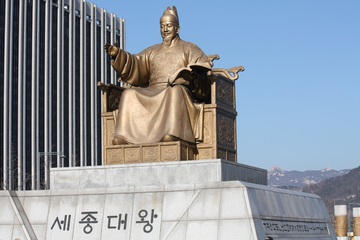
King Sejong The Great, 4th monarch of Chosun dynasty and creator of the Korean alphabet Photo by Pxhere.
October 9th is Hangul Day, a national Korean holiday commemorating the creation of the Korean alphabet by 15th century monarch, Sejong the Great. Korean is the official language of the Republic of Korea (South Korea) and the Democratic People’s Republic of Korea (North Korea), spoken by 75 million people worldwide.
As South Korea’s influence in the global economy continues to grow, it might be beneficial to learn the language to make yourself more desirable in the job market. If you’re visiting Korea or are interested in working at a Korean company, here are three benefits of learning Korean.
1. Improve personal and business relationships Before you book your plane ticket to Korea, learn simple and basic phrases, such as:
Hello – An-nyeong-ha-se-yo
Nice to meet you – ban-gap-sum-ni-da
Thank you – kam-sa-ham-ni-da
Challenge yourself by talking to strangers in Korean and practice your pronunciation. You’ll be surprised by the benefits you’ll receive by interacting with other Koreans. Korean people are very receptive toward international visitors, so don’t be shy. Build relationships with them to have a more enjoyable time during your stay. Speaking Korean can also lead to employment opportunities. If you can speak Korean and English interchangeably, translation jobs offer good pay with flexible hours. If translating is not your cup of tea, there are other options: Korean business conglomerates, such as Hyundai, LG, Samsung and Korean Air aggressively recruit high-achieving bilingual graduates. Working for these companies offers good pay, job stability, and valuable experience.
2. Expand your cultural horizons Learning the Korean language can broadens cultural perceptions, especially if Korea is the first international country you’re visiting. Korea’s wired culture, innovative cosmetics, and energetic nightlife are all exciting aspects to enjoy when residing in Korea. Learning the Korean language can enhance these experiences as you’ll be interacting with Koreans who speak the language. Immersing yourself in these cultural experiences encourages open-mindedness and acceptance of different cultures and people.
3. Knowledge of the history of the Korean alphabet While there are tangible career and cross-cultural benefits to learning Korean, there are also intangible benefits from learning the history of the Korean alphabet. During the 15th century, King Sejong was the 4th monarch of the Chosun dynasty, a long period in Korean history that lasted from 1392 to 1910. King Sejong believed in the importance of education, so he created Hangul to provide Koreans with an easier script for their spoken language. Previously, Koreans relied on the Chinese script, but the complicated Chinese characters and the differences in their pronunciations made it almost impossible for middle and lower income Koreans to learn the script. With this goal, King Sejong, along with a group of scholars, created an easier phonetic writing system and completed it in 1443.
If you want to learn an interesting and useful Asian language, consider learning Korean. It can offer many benefits and truly make you a more competitive candidate in the international job market.
Sharon Schweitzer and Sunny Kim co-wrote this post. Sharon Schweitzer J.D., is an award-winning entrepreneur, cross-cultural trainer, and the founder of Access to Culture. In addition to her accreditation in intercultural management from the HOFSTEDE Centre, she serves as a Chinese Ceremonial Dining Etiquette Specialist in the documentary series Confucius was a Foodie, on Nat Geo People. She is regularly quoted by BBC Capital, Investor’s Business Daily, and Fortune. Her Amazon #1 Best Selling book in International Business, Access to Asia: Your Multicultural Business Guide, (3rd printing), was named to Kirkus Reviews’ Best Books of 2015. She’s a winner of the British Airways International Trade Award at the 2016 Greater Austin Business Awards.
Sunny Kim is a Fall 2017 Cross-Cultural Communication intern with Access to Culture. She is currently a junior journalism student at the University of Texas at Austin with a minor in Korean language and certificate in business. She is also the founder and president of UT Asian American Journalists Association. Her main focus is storytelling people’s diverse experiences relating to race and culture. Connect with her on Linkedin.

Leave A Comment